It's not for everyone, but as more and more older Americans choose to Age in Place while remaining in their homes, issues related to maintaining mobility, promoting home safety and creating an environment to meet care needs are becoming increasingly important to both caregivers and care recipients. According to the AARP nearly 90% of older adults want to Age in Place and maintain independence; however, 85% have done nothing in preparation for it. Many retirees want to stay living in their own house for as long as possible. But being able to do so will depend on how easy it is to maneuver throughout their home as they get older. A plan for Aging in Place must be put into place as soon as possible to avoid mishaps. Research by the Centers for Disease Control and Prevention show that applying the correct Aging in Place home modifications per individual client need may prevent up to 50% of home accidents among seniors in older homes including falls.

Once families are suddenly thrust into the responsibility of caring for an aging, ill or injured family member, knowing how to make their home accessible, barrier-free and safe can be challenging. Even families that are savvy and experienced about these issues may have trouble figuring out whom to call for a roll-in-shower, ADA-compatible kitchen, or a door widening. Do not fear, there is knowledgeable and experienced help for this matter locally available.
The National Association of Home Builders, in partnership with the AARP and Home Innovation Research Labs, created the CAPS program, which includes training and education on the technical, business management and customer service skills essential to compete in the fastest growing segment of the residential remodeling industry--home modifications for aging in place. David L. Traut, CAPS, the President and owner of T-Square Company in Austin, Texas, is a handicap remodeling contractor professionally practicing his craft for nearly thirty years. He is one of the select group of professionals nationwide to earn the Certified Aging-In-Place Specialist (CAPS) designation, identifying him as a home remodeler and builder with the skills, training, and knowledge necessary to design and remodel or modify a home to meet the unique needs of the older population, disabled owners, or their visitors. He incorporates the principles of Universal Design into all his design/build projects. T-Square Company specializes in home modifications for seniors.
By the way, David has recently published a book entitled "Age in Place at Home: Adapting the Home Environment for All Generations". It is available on Amazon and stands as a reference book for increasing home accessibility using the principles of Universal Design.

Home renovations for Aging in Place positively affecting a homes interior design include adding non-slip flooring, widening hallways or installing stair lifts, and widening doors. You should also consider lowering light switches and thermostats and installing easier to use door levers. Many considerations for an Aging in Place design should be taken into account to provide safety and independence. Always provide a clear barrier-free path or accessible route to the most visited areas of the home as recommended by the ADA. The three areas needing improvement for a person wanting to Age in Place include the bathroom, the kitchen, and the family area in order of importance. ADA compliant kitchen cabinets and ADA bathroom cabinets will more than likely come into play to complete any accessible home remodeling project.
Furthermore, due to the inaccessibility of existing traditional homes, people interested in Aging in Place services are looking for a level entry into their home along with the maneuverability that a more open floor plan having greater clear unobstructed floor space presents. They desire flat non-skid floors without transitions requiring steps or stairs to move around. If ramps are used to overcome stairs within the design, they have a correct 1:12 slope or less. The ramps can be used to get the homeowner up to the level floor space at the exterior entries or the garage access.
Wheelchair Accessible Kitchen In Austin
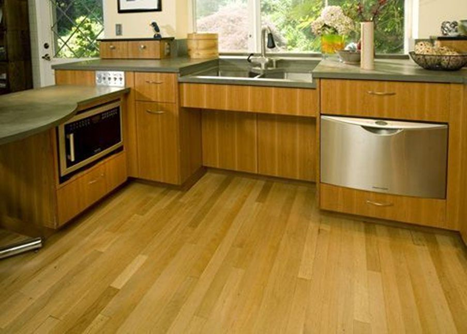

Let's compare the alternative costs associated with Aging in Place when you already own your home verses moving away from familiar surroundings and neighbors. The more institutional alternative of assisted living accompanied by more medical expertise and staff training plus the access to emergency medical facilities is available as opposed to renting an apartment. These are two of the main alternative choices for seniors who decide not to remain in their own homes. According to a national study done in 2021, the average cost for assisted living ranged from $4,000 to $5,500 per month. However, if you decide to Age in Place in a high quality one bedroom apartment, the rent will run around $2,500 per month. Living in your own home or with loved ones represents a preference by most seniors and property taxes must be taken in account. In this case, there is also the positive effects of home equity being available to fund the required home modifications. But what are the costs involved?
An average Aging in Place master bathroom/bedroom suite modification intended to provide total accessibility will come in around $35,000, given there is a large enough space to remodel at onset. This can vary in many aspects if there is not enough room to change the existing floor plan. Smaller bathrooms can cost $15-20,000 to modify; but generally will not have the barrier-free accessibility compared to the larger modified bathroom. Fully accessible kitchens cost on the average of $50,000 to modify, depending on the size and layout of the existing kitchen. These are both one time costs for sustainability of a given lifestyle and location providing future independence and safety for the homeowner who participates in accessible home remodeling.
All disability home remodeling or disability bath remodels in Austin must be done considering all the data provided by the client, his or her family, and any caretakers involved. Aging in place design must be carried out by an Aging in Place specialist who is also a reputable residential remodeling professional. The goal of an accessible bathroom design in Austin is to make the bathroom a safer space for everyone who uses the facilities. Aging in Place services use Universal Design to accommodate wheelchair use and can make the bathroom more comfortable for all generations with or without specific needs. If a design allows wheelchair use, it also allows greater accessibility for everyone universally.
For additional information about the CAPS program, visit nahb.org/CAPS. For more information about T-Square Company, visit www.tsquareco.com or call 512-444-0097 to schedule a home assessment by a CAPS professional.
Tags:
barrier free access,
aging in place remodeling,
aging in place home modifications,
ADA remodeling,
ADA bathroom cabinets,
ADA kitchen cabinets,
aging in place designs,
accessibility home remodeling in Austin,
CAPS professional in Austin,
CAPS certification holder in Austin,
CAPS remodeling techniques,
disability bathroom remodeling in Austin,
bathroom modifications for elderly,
aging in place specialist,
aging in place services,
elder construction,
certified aging in place specialist,
handicap remodeling contractors in Austin,
independent living in Austin Texas,
senior aging in place services
How do you go about designing an Aging in Place bathroom? This is a common question weighing heavily on the minds of today's aging homeowners. Truly, Aging in Place is all about living independently for as long as possible within your existing home. It is also about being safe and healthy within your home which has had architectural barriers or dangerous areas removed using proven practical home modifications. Trained and certified CAPS professionals are working throughout the residential remodeling industry demonstrating how you can Age in Place with the greatest freedom of movement and maneuverability. Aging in place home design is a concept promoting independence and livability for all types of living environments no matter the age or level of abilities of the occupants. The principle is not entirely age related as recuperation periods from injuries or the progression of debilitating diseases like MS happen to anyone at any age.


Just imagine being an active 60-70 year old adult who is able to participate in a full array of activities. This person may continue to work well beyond retirement age, enjoy sports, and travel wherever he or she desires. Then imagine how this same person might react to recovering over a six to eight week period while recuperating from a hip or knee replacement. The inability to move from the bedroom to the bathroom or kitchen without the use of a cane, walker, or wheelchair can be psychologically devastating. Or imagine a person whose hands are now disfigured from the crippling effects of arthritis and they have lost the ability to grasp objects. Just turning on a sink faucet or opening drawers can seem insurmountable to a person with such disabilities. The homeowner has become a prisoner within their own realized inaccessible home in one way or another. This scenario can be avoided by proactive bathroom designs.
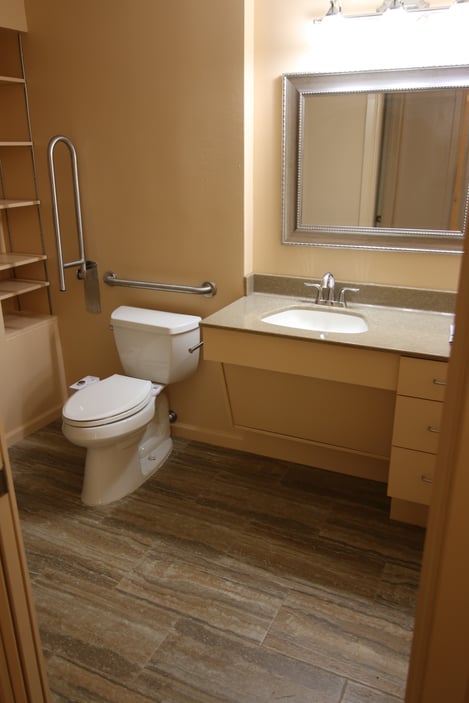

The physical challenges brought about by narrow hallways and doorways or high thresholds at the home's main entrance or shower area can create an impasse as they now have become physical barriers within the home. Not only has the ability to step over these barriers diminished but standing up from being seated on a low toilet seat has become almost impossible. Imagine the psychological impact of this limited environment on an individual who previously was accustomed to being fit, useful, and independent.
To accommodate the prospect of such physical challenges, dramatic changes to one's home may be necessary in order to Age in Place. Effective home adaptations and modifications can make any home safer and more manageable. Making important design decisions early in our lives can minimize the physical barriers and restrictions in one's home and secure access to the most essential areas like the kitchen and bathroom. This forethought will insure the dignity and independence for the homeowner in the event their mobility becomes restricted.
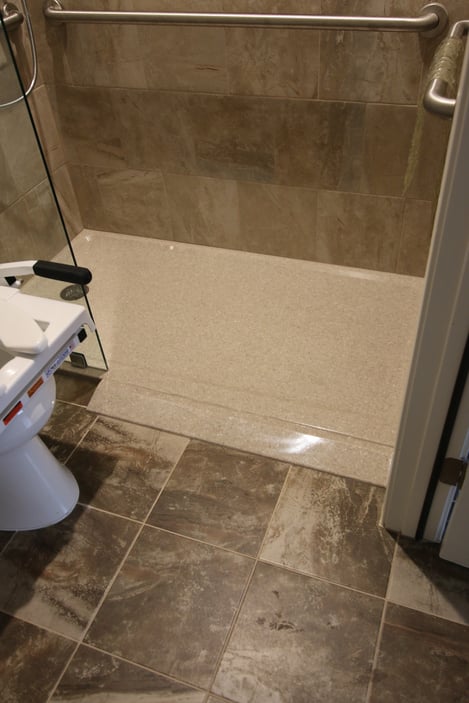
Universally, the Aging in Place bathroom is a little more spacious than in a traditional home with a five-foot turning radius observed. The new bathroom design is safer by reducing the potential for falls. In fact, there are many benefits to using Universal Design techniques, including potential use by aging family members, added resale value appealing to multiple generations, and the fact that you'll be creating a space that can be used by anyone who visits your home, regardless of their size or range of abilities. Bathrooms can be both functional and attractive when planned using elements of Universal Design like cabinetry that allows someone to sit at a barrier free bathroom sink. Either wrist handles or levers control all the faucets throughout the bathroom. Incorporate simple Universal Design updates for aging in place home modifications and handicap bathroom accessibility. Add secure ADA-compliant grab bars or handrails mounted on wooden blocking throughout the room around showers and accessible toilets, install adequate glare-free lighting in the shower and over work areas to prevent dark spots, perform a custom tub to shower conversion, add a seat within the curb-less roll in shower, provide recessed shelving within the shower to reduce floor clutter and tripping hazards, install a taller comfort-height toilet with a bidet attachment, lower upper cabinets and countertops or provide multiple layers for greater adaptability, add non-slip flooring, expand traffic ways, and widen entry doors. You might also consider lowering light switches and other electrical controls and installing easier to use door levers. Many considerations should be taken into account to provide safety and independence. You should try to provide a clear barrier free path or accessible route to this most visited area of your home as recommended by the ADA. Don't be afraid to spread the room out, because if the new design works well for wheelchairs, it works for everyone. Well planned accessible Aging in Place bathrooms lift the spirits and enhance dignity. They have the ability to transform our relationships with our bodies and our homes.

The National Association of Home Builders, in partnership with the AARP and Home Innovation Research Labs, created the CAPS program, which includes training and education on the technical, business management and customer service skills essential to compete in the fastest growing segment of the residential remodeling industry--home modifications for aging in place. David L. Traut, CAPS owner and President of T-Square Company in Austin, Texas as a handicap remodeling contractor is one of the select group of professionals nationwide to earn the Certified Aging-In-Place Specialist (CAPS) designation, identifying him as a home remodeler and builder with the skills, training, and knowledge necessary to design and remodel or modify a home to meet the unique needs of the older population, disabled owners, or their visitors.
By the way, David has recently published a book entitled "Age in Place at Home: Adapting the Home Environment for All Generations". It is available on Amazon and stands as a reference book for increasing home accessibility through Universal Design.
For additional information about the CAPS program, visit nahb.org/CAPS. For more information about T-Square Company, visit www.tsquareco.com or call 512-444-0097.
Tags:
ADA compliant kitchen cabinets,
aging in place home modifications,
aging in place home improvements in Austin,
aging in place construction,
accessibility home remodeling in Austin,
CAPS professional in Austin,
accessible home remodeling,
aging in place specialist,
aging in place services,
Austin elder construction,
bathroom accessibility remodels in Austin,
ADA bathroom Austin, Texas,
roll in showers,
roll in showers in Austin,
walk in shower designs Austin,
home modifications for independent living Austin,
disability access bathrooms Austin,
Austin Handicap Remodeling,
universal design ideas,
Austin accessible home remodeling,
certified aging in place consultant in Austin,
aging in place specialist in Austin,
aging in place design in Austin,
senior aging in place services,
age in place home design,
home accessibility help in Austin,
home access,
barrier free home design,
Age in Place at Home,
home modifications for aging in place,
barrier free bathroom layout
If you have suddenly become caregiver for your aging parents, you are not alone. Everyone is living longer only to experience many life-challenging events during an extended lifespan, but some people require a little assistance. It could involve technology issues or helping them determine a path forward while living in their home. Many aspects are involved with senior living solutions, and the correct route is determined on an individual family basis. The desire to remain in one's current home is not driven by age. This need is a reaction to and the result of life's experience. Any family living with a disability among any of its family members will always benefit from familiar surroundings. To increase safety and independence within your current home, certain modifications to increase accessibility and use are typically required. These modifications include but are not limited to wider doorways, the installation of ramps, inclusive kitchen modifications, accessible bathroom modifications, and the application of smooth, non-skid flooring. When planning on what modifications are needed, always make a list of the home's most problematic areas for any or all of its residents. This basic desire is creating unprecedented nationwide challenges and a niche market in the remodeling industry known as Aging in Place. The majority of Americans over the age of 45 want to continue living in an environment they are well acquainted with throughout their maturing years. These people are looking for safety, security, ease of use, and comfort for their forever home before they must vacate due to specialized needs.
A forever home is unlike a starter home, and each occurs at different times during a resident's life. A starter home is a smaller home needed when you are starting out. It represents a stepping stone. This is a popular option concerning younger homeowners because it's more affordable. The forever home has the ability, through proactive planning and existing home modifications, for a family or all family members to live in the house for a very long time prior to anyone needing full time professional assistance. This home contains accessibility for everyone, regardless of their age, size, or abilities. During life's voyage, the forever home should become a reality as early as possible. This reality means the family can enjoy the comfortable home longer. It has adequate access through wider entries and doorways, a larger kitchen, larger bathrooms, larger bedrooms, and an accessible front and back yard. The more expensive larger forever home has room to comfortably maneuver about when using mobility devices since architectural barriers are nonexistent.

But where did this commonly seen lack of home accessibility in nearly all homes come from? Perpetual, status quo building techniques, and affordability provide the answers. Over time, along with the exponential birth rate of the baby boomers in the late 40s and 50s, the need for more housing created sprawling American suburbs to accommodate the growing families. Developments sprang up with few architectural options while affordability was the main concern. Today, these same homes slowly and increasingly signify outdated and obsolete architectural barriers exposing a true lack of accessibility for the very people inhabiting them. The situation is ever more expanding in time since the greatest majority of individuals want to age where they currently reside.
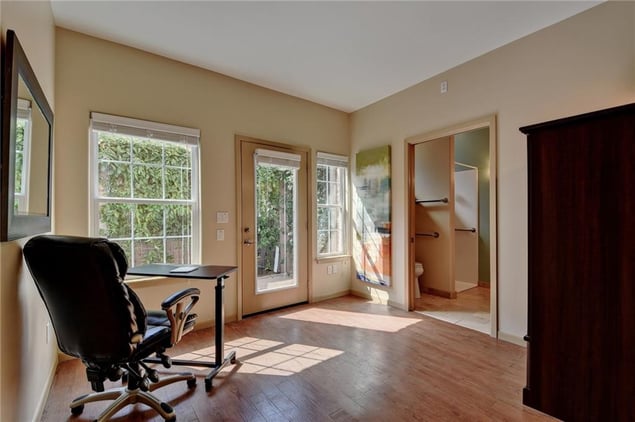
According to the AARP, 80 percent of older homeowners overwhelmingly prefer to Age in Place, which means living in a home safely, independently, and comfortably, regardless of age or ability level. People with disabilities are aging but some healthy individuals are aging into a disability. Aging in Place strictly deals with the remodeling of existing homes. Therefore, to Age in Place, owners need to gradually modify their homes as they mature by increasing access and safety using the principles of Universal Design before a life-changing event forces making sudden architectural changes. The Aging in Place market in the U.S. today is influenced by the increasing size of the aging population, the market desire to remain in one's home, a constantly increasing cultural diversity, and the aging housing stock associated with reduced affordability. The desire to remain in existing homes is driven by social attachments via a network of neighbors, friends, and family. Comfortable positive aging is a way of living rather than a state of being. What's more, seniors who took a proactive approach in modifying their homes over time offer peace of mind to their loved ones or caretakers who know their family members are living safely and independently in their homes.

Clearly, the act of Aging in Place occurs during a period of time when mature homeowners or seniors have the ability to make decisions to better support an increased quality of life. There are three segments served within the Aging in Place marketplace. The first segment includes those homeowners without urgent needs. The second segment focuses on a group of homeowners with progressive health needs. The third sector involves those people who have undergone traumatic health changes or accidental injuries necessitating immediate modifications to the home. The choice to Age in Place does not mean the homeowner has to do everything in the future by themselves. Aging in Place principles supports responsible people living life with dignity and independence even when outside assistance is essential.
T-Square Company is one of Austin's premier Aging in Place contractors offering complete Aging in Place services from home assessments to design/builds. We have over 30 years of accessibility knowledge to share with our clients making their home life less complicated. We hold a nationally recognized CAPS certification (Certified Aging in Place Specialist) offered by the National Association of Home Builders, NAHB. Contact T-Square Company today to find out how to proceed toward an accessible second chapter of life while your aging parents remain in their home. We offer complete Aging in Place design services.
By the way, David Traut, the President/owner of T-Square Company has recently published a book entitled "Age in Place at Home: Adapting the Home Environment for All Generations". It is available on Amazon and stands as a reference book for increasing home accessibility through Universal Design.

Tags:
aging in place remodeling,
aging in place home modifications,
aging in place home improvements in Austin,
frameless European,
aging in place designs,
accessible home remodeling,
Universal Design,,
aging in place services,
home modifications for independent living Austin,
universal design ideas,
Austin senior living solutions,
certified aging in place consultant in Austin,
aging in place specialist in Austin,
universal design remodeling contractor,
7 principles of universal design,
applying principles of universal design in Austin,
Austin disability contractors for special needs,
barrier free remodeling,
accessible homes,
universal design/build contractor,
why universal design,
what is universal design in Austin,
what is aging in place,
universal design techniques,
accessible home builder in Austin,
the basics of aging in place,
barrier free home design,
Disability Remodeling Services in Austin, Texas,
Universal Design for Disabilities,
aging in place services for seniors in Austin,
forever home,
aging parents caregiver guide
Most recently, architects and designers, with the help of CAPS professionals, have been concentrating on revising home interior design basics. The obvious outcome is slowly we are creating design principles and strategies that accommodate the full range of human capability rather than only the fully-functional part of society. This field of flexible or inclusive design is called Universal Design and its goal is to create easily accessible living and working spaces without exclusion to anyone. Instead of appearing as a hospital extension, the thoughtful new designs are appealing, stylish and comfortable for everyone; not just the elder or severely disabled among us. Therefore, the world of boundaries and barricades is beginning to lessen while we overcome the nationwide problem one home at a time. This is a testament to the senior and disabled population demanding equal access to their homes.
The ADA rules came about in 1990, but unfortunately the ADA rules do not apply to the private residential market. However, these rules can be used as a guide for better accessibility in private homes. Seniors and disabled homeowners must depend on the knowledgeable CAPS certified private sector of builders and remodelers to remedy the housing shortcomings. They will supply the recommended aging in place home modifications. Universally, every home should be accessible to all inhabitants and their visitors regardless of their age, size, or physical abilities. Caring for someone with special needs is a unique and sometimes lifelong challenge. Whether it’s a child born with a disability, someone who has suffered an unfortunate accident or medical event causing them to lose abilities they once had, or an older family member in declining health needing assistance with daily life, the work of a special needs contractor can help make things easier for both the affected individual and their caregivers.
Accessible Bathroom Modifications In Austin
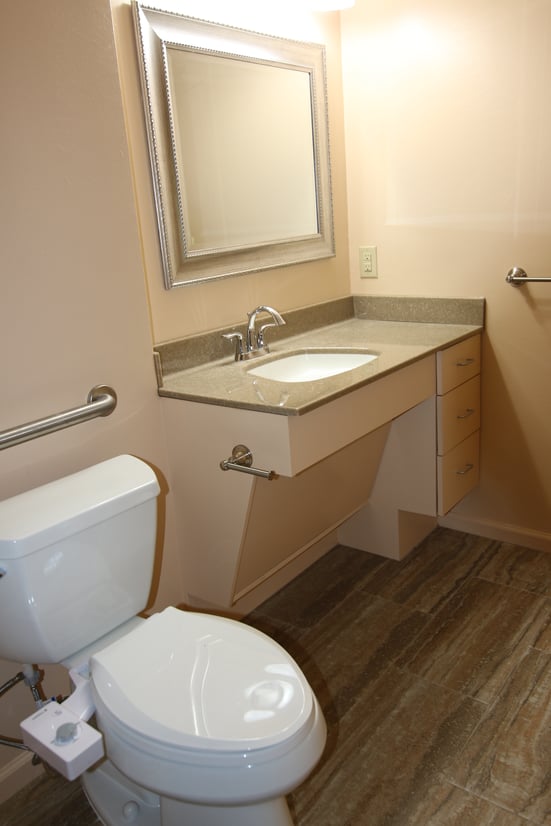
What are the most important home modifications for seniors and the disabled to increase their quality of life? Here is a list of considerations for Aging in Place.
- Replacing door knobs with lever devices.
- Widening doorways and hallways.
- Increasing lighting, especially around stairs and work areas.
- Installing curb-less showers.
- Installing grab bars, especially in wet areas.
- Installing taller comfort-height toilets.
- Installing ramps to overcome level changes.
- Installing lever-controlled faucets.
- Installing hand-held shower devices.
- Adding a shower bench.
- Replacing flooring with any non-skid type.
- Utilizing smart home devices like electric door openers and remote light switches.
- Undergoing kitchen modifications to increase comfort and safety.
- Making bathroom modifications to increase safety and usability.
- Installing a stair lift or vertical platform lift.
T- Square Company located at 14141 Highway 290 West, Suite 800 in Austin, Texas is an industry leading accessible, universal, certified Aging in Place and VA approved Specially Adapted Housing home builder and remodeler. T-Square offers design/build projects for both totally accessible homes from the ground up or complete handicap modifications for existing homes to Age in Place. Be aware, traditional home builders and remodelers do not consider or understand the needs of the disabled or elderly. They deal mainly with the two thirds of our society without disabilities or special needs. They do not have the knowledge or experience required to think out of the box when creating a special needs home. It requires a trained and educated accessible home builder or contractor to visualize special needs modifications for special people.

T-Square Company will design and build you an adapted living environment which is completely customized around your abilities. Whether your project concerns home modifications, an accessible addition or wing, or new construction derived from a handicap accessible floor plan they can help you increase your accessibility. David Traut, the president/owner, is CAPS certified (1636580) and has over three decades of building and remodeling experience practicing as a disability contractor for special needs. He wants to help his clients be as self sufficient and independent as possible. Let David show you how to increase the safety and accessibility within your personal living environment.
By the way, David has recently published a book entitled "Age in Place at Home: Adapting the Home Environment for All Generations". It is available on Amazon and stands as a reference book for increasing home accessibility through Universal Design.

Contact T-Square Company today at 512-444-0097 so we can show you how to begin a new accessible chapter in your lifetime.
Tags:
aging in place home modifications,
accessibility home remodeling in Austin,
aging in place specialist,
aging in place services,
Austin Senior Home Remodeling,
handicap accessible bathroom remodeling,
Austin aging in place specialist,
handicap bathroom remodel,
accessible home remodeling for disabilities,
barrier free showers in Austin,
ADA compliant roll in showers,
handicap ADA roll in shower,
wheelchair accessible shower stalls,
accessible bathroom design specifications,
home remodeling contractors residential,
disabled bathroom remodel,
specialty construction in Austin,
what is an ADA compliant bathroom,
home access in Austin,
home accessibility,
wheelchair accessible housing,
accessible homes in austin,
accessible home modifications,
wheelchair accessible bathroom,
handicap bathroom design,
handicap bathroom vanity,
handicap bathroom contractor in Austin,
handicap accessible floor plans,
accessible home builder in Austin,
special needs contractor,
universal home design in Austin,
home renovations for disability in Austin,
ADA Accessibility,
ADA Contractor/Austin, Texas,
Barrier-free designs
If you are a senior or considering moving in an elderly parent into your home, you might find this information useful while pondering the subject to move forward.
The Aging in Place market in the US today is constantly influenced by the increasing size of the senior population, the desire to remain in one's home, a constantly increasing cultural diversity, and our aging and inaccessible housing stock with it's reduced affordability. Let's face it, accessible homes are needed by all of us at some time in our lives. This is true whether it's for ourselves, a family member, or a guest. Each individual with similar impairments describes his or her limitations differently. The blind don't experience their world the same as a person with deafness. The need is certainly not driven by age but is a result of life's experience. Any family living with disability among any of it's generations within it's group will always benefit from additional accessibility. This will in turn increase safety and independence for all involved as they go through life.
Actively searching for senior living solutions, the aging population is made up of two prominent age groups formed by the age 65 and over population and the baby boomers. The baby boomers were born between 1946 and 1965 as a result of WW II. Together these two groups own over 48% of all the US home inventory today. The desire to remain in one's home is driven by social attachments via a network of neighbors, friends, and family. Our cultural diversity assures that the same Aging in Place solutions cannot work across the board for all individuals, just as an individual's ability to live independently varies from person to person. With the constantly aging housing inventory, costs can be a major barrier in home modification for many residents. A catch 22 situation arises once you consider the reduced affordability of another home versus the one presently occupied by seniors. In this case the homeowner must use the equity that has accrued in their home's value in order to make the modifications required to safely move forward. Obviously, in the long run, it's cheaper to remodel an existing home using accrued assets than it is to buy a new home in today's inflated market only to endure closing costs, moving costs and the associated stress.
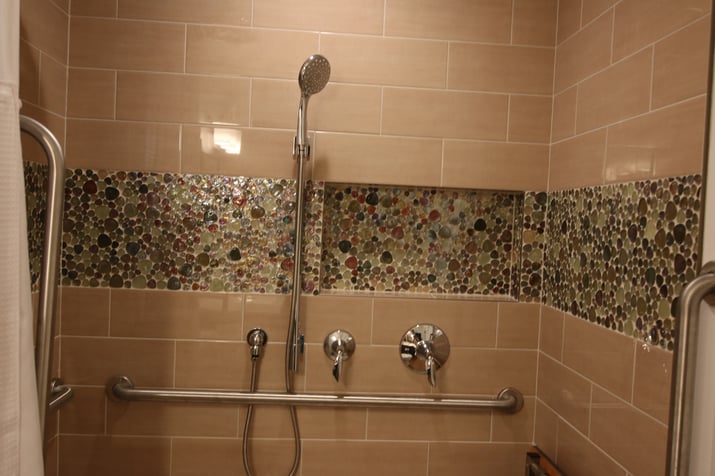
Some people confuse Aging in Place with Universal Design. Both are methods to increase home accessibility but Aging in Place strictly deals with an existing home, and is applied only when needed. Aging in Place implies modifying any home for it's occupants as a result of physical changes to ensure that the inhabitants can safely remain living in the home for as long as possible. Thus, it represents a reactive approach as a solution for providing home accessibility to the unprepared and procrastinating occupants. This time will expire once the senior homeowners require assisting medically trained help for ensuring their personal safety in a nursing home or an assisted living environment. In comparison, Universal Design offers choices to all home residents, no matter their age, size, or physical abilities. It can become part of any home at any time so all the occupants can enjoy the positive effects longer. Once undertaken by a proactive homeowner, the universal process begins with a design and then the construction begins. This process makes way for the home's comfort, safety, and usability to be enhanced. When Universal Design is incorporated into remodeling or new builds, these homes can accommodate the changing needs of their owners without further alterations. Over time, increased accessibility is there when it is required without disruption or calling attention to any family member.

For unprepared seniors, the demands of their home environment might eventually exceed their capacities forcing the inhabitants to become excluded from a room or even the entire home. In truth, physical limitations affect many more people than the daily users of walkers and wheelchairs. Many members of our life-experienced or senior society have significant problems safely dealing with their home environment due to today's conventional building standards. These status-quo building methods conflict with most people's accessibility, while the industry has routinely created homes full of architectural barriers. Individual strength, range of motion, movement, manual dexterity, balance, and coordination evolve over time as we become more life-experienced. The number one safety hazard in a home for seniors is negotiating level changes--steps at the entry, stairs between floors, and curbs to step over when entering the shower. Eliminating level changes is very difficult in existing homes and almost impossible to do aesthetically without considerable compromises, unless there is a major renovation. Sadly, the end result is that most homeowners decide to sell the house facing this situation rather than make the modifications. Fortunately, most traditional homes are capable of being modified.
Any accessibility design for seniors should always be performed by a CAPS certified builder or remodeler to provide a professional and safe path forward for seniors. This is the only way that you can be assured that the home modifications are the right choices to satisfy your needs. There is no need to waste money only to find out that the wrong alterations were done by an inexperienced and unqualified remodeling company. Modifications to bathrooms and kitchens, the two most used rooms in a home, must take everything about a persons personal behavior into consideration. Bathroom modifications typically include custom tub to shower conversions, a custom walk in shower, an ADA-compliant toilet, or an accessible roll-under vanity. These are all great ways to make the bathroom safer and more accessible. Other bathroom concerns involve storage cabinetry and door opening widths. When it comes to the kitchen, ADA-compliant kitchen cabinets including roll-under cooktops, sinks, and food prep areas are important. Accessible storage for food and cooking items is needed along with adaptable multi-level cabinet working surfaces. All kitchen ADA-compliant appliances should be installed so a person using a wheelchair has access. Therefore, each appliance has associated clear floor space for approach and maneuvering. Remember, if the layout works well for the wheelchair user, it works for everyone. In general, a senior's home should be free of clutter, and every adequate room should have ample clear floor space for approaching certain items. Every area of the home is accessible without involving architectural barriers. But who do you contact to be sure you are getting the accessibility you desire?
The National Association of Home Builders, in partnership with the AARP and Home Innovation Research Labs, created the CAPS program, which includes training and education on the technical, business management and customer service skills essential to compete in the fastest growing segment of the residential remodeling industry--home modifications for aging in place. David L. Traut, CAPS owner of T-Square Company in Austin, Texas is one of the select group of professionals nationwide to earn the Certified Aging-In-Place Specialist (CAPS) designation, identifying him as a home remodeler and builder with the skills and knowledge necessary to remodel or modify a home to meet the unique needs of the older population, disabled owners or their visitors. David has recently published a book called "Age in Place at Home: Adapting the Home Environment for All Generations". It is available on Amazon.
For additional information about the CAPS program, visit nahb.org/CAPS. For more information about T-Square Company, visit www.tsquareco.com or call 512-444-0097.

The building world must work in unison to be sure the entire living environment meets basic needs in addition to affordability and structural integrity for the consumer and home owner. This includes both the home and the components within the home being accessible to all inhabitants. Privacy, sense of belonging, sense of control, and the sense of safety and security make up the quality of life for any home and should be considered for any design.

Tags:
aging in place home modifications,
handicap home modifications,
aging in place construction,
aging in place designs,
CAPS remodeling techniques,
Universal Design,,
aging in place specialist,
aging in place services,
elder construction,
independent living in Austin Texas,
Austin elder construction,
handicap accessibility,
bathroom modifications for disabled,
accessibility remodelers in Austin,
roll in showers,
handicap bathrooms,
home modifications for independent living Austin,
universal design ideas,
Austin Accessibility Design,
Austin senior living solutions,
Austin handicap bathroom contractor,
Austin home remodeling for disabled,
ADA Accessibility,
Barrier-free designs
I am reposting this invaluable announcement of my book's availability in an effort to help many struggling families who have discovered their home no longer fits their personal physical needs. Sudden or mounting changes among any family members affects how livable and accommodating their present home truly is. Once a major change occurs, modification of your residence must be undertaken or you will face moving to a more accessible home. A home's newly-discovered architectural barriers are represented by problems entering the home, difficulty in using the bathroom or its facilities, or merely maneuvering throughout a familiar residence. My book acts as a guidepost for perplexed homeowners and caretakers trying to determine their family's next immediate direction and imminent future. The first half of the book explains why homes have always been inaccessible, except on the day they were purchased. The second half takes you room by room through the home as I explain how applying the principles of Universal Design for Aging in Place makes the home comfortable and accessible for the largest number of people.
After over a year of writing to fulfill my customers' requests, my new book, "Age in Place At Home: Adapting the Home Environment for All Generations" , is available for purchase from Amazon. Go to the link below to order my paperback book, which was released in late November, 2022. It provides a great guideline for using the principles of Universal Design in new home construction and/or remodeling for every room in your home. Get your copy today.
https://www.amazon.com/gp/r.html?C=2Z24ENUUAEWUK&K=13Y7YU7PKKYAC&M=urn:rtn:msg:20221010201802eb9acb7b24004a4785cd2ec1d4f0p0na&R=3R6MK9WDXJPH7&T=C&U=http%3A%2F%2Fwww.amazon.com%2Fdp%2FB0BHTV28RV%3Fref_%3Dpe_3052080_276849420&H=7FWEPMGCH0TT8LN6SKPMUOCVJNYA&ref_=pe_3052080_276849420
A home's adaptability is one of the most desired qualities within a person's home during some point in their life as their or their family's needs change. These specific needs to enhance accessibility can be short term while recovering from an accident or illness at any age, or these home alterations may become permanent. The special needs may concern an adult or a child. Universal design principles don't discriminate between any family members regardless of age, size, or ability. Every family member is included. Learn how to adapt your home environment to satisfy your family's needs in David Traut's new book, Age in Place at Home.
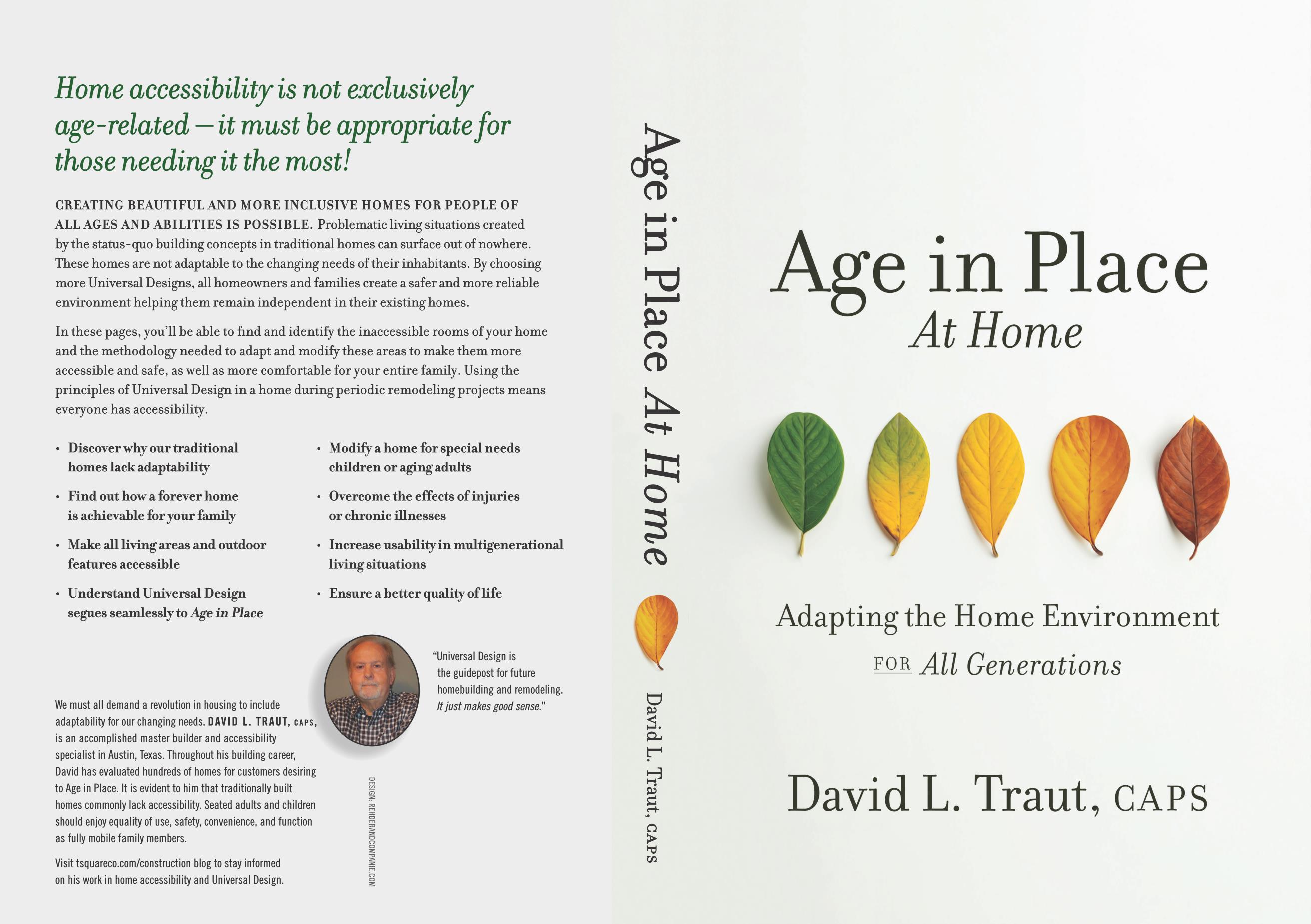
T-Square Company, in Austin, Texas, practices incorporating Universal Design for accessibility to help their clients segue into Aging in Place seamlessly. The essence of my book is to advise people so they understand why our homes are obsolete to us, the homeowners, the minute they are completed. This fact is represented by the methodology used to create the traditional home. They are built to satisfy our immediate lifestyle and physical needs on the day we close on the house, with no regard for the future. The new home lacks adaptability to satisfy our needs once our bodies change beyond the purchase date. If we had incorporated the Universal Design principles into these new homes, those same homes would adapt to our changing family needs including every inhabitant regardless of age, size, or ability. The lack of home adaptability is not the consumers fault, they have always been unaware of how to reference the problem and accepted what the housing market gave them. Buyers were unaware of what to ask for. Hence, the status-quo of building has been perpetuated for centuries.
T-Square Company offers all types of Austin Universal Design home modifications for Aging in Place and Aging in Place design to better prepare you and your family for your unforeseeable home accessibility future on a design/build basis. Existing, traditional homes must be modified at some unknown point in time to increase their accessibility using correct designs. This collaborative effort is undertaken in order to help the residents who need better accessibility the most. Become aware and embrace the knowledge that the principles of Universal Design offer greater home accessibility for every one of your home members, from your father to your son. This is why the process is known as inclusive design.
David L. Traut, CAPS, is an Aging in Place specialist and has been involved with accessibility for over thirty years for the VA, HUD, various counties, and private residences. Contact David at 512-444-0097 for a professional home assessment to guide your future accessibility needs or at www.tsquareco.com. Simply fill out your information on the contact us page.
.
Tags:
aging in place home modifications,
aging in place home improvements in Austin,
wheelchair accessible remodeling,
CAPS certified remodeling in Austin,
aging in place construction,
CAPS professional in Austin,
aging in place services,
accessibility designs Austin Texas,
austin custom walk in shower,
universal design ideas,
Austin Accessibility Design,
aging in place design in Austin,
why is aging in place important,
what does it mean to age in place,
universal designbuilding for the future,
wheelchair accessible home remodeling in Austin,
universal design remodeling contractor,
why is universal design important,
7 principles of universal design,
universal principles of design,
universal design/build contractor,
universal design vs. aging in place,
universal design contractor,
wheelchair accessible housing,
accessible homes in austin,
Austin home remodeling for disabled,
universal home design in Austin,
aging in place versus universal design,
universal design home builder,
universal design home additions,
barrier free design,
Austin home accessibility solutions,
Austin home modification services,
Age in Place at Home,
universal design forever homes
When families are suddenly thrust into caring for an ill or injured family member, knowing how to make their homes accessible, barrier-free and safe can be challenging, especially when it involves an aging parent. A professional CAPS-certified remodeler is needed to offer guidance and solutions to the discovered family problems. Aging in Place is not for everyone, but as increasingly older Americans choose to Age in Place and remain in their homes, issues related to maintaining mobility, promoting home safety, and creating an environment to meet care needs are becoming increasingly crucial to caregivers and care recipients, along with the building community. Even savvy and experienced families may have trouble figuring out whom to call for a roll-in shower or door widening. According to the AARP, nearly 90% of older adults want to Age in Place and maintain independence however, 85% have done nothing about it. Many retirees want to stay in their own houses for as long as possible. But being able to do so will depend on how easy it is to maneuver your home as you age. Research by the Centers for Disease Control and Prevention shows that Aging in Place home modifications may prevent up to 50% of home accidents among seniors in older homes, including falls. T-Square Company is a certified disability access contractor in Austin, Texas, doing accessibility jobs for the VA, HUD, and the private sector for nearly thirty years. T-Square Company offers a complete line of Aging in Place services using their design/build approach. T-Square Company's Aging in Place services incorporate the principles of Universal Design to better accommodate wheelchair users or people with varying disabilities, making the home environment more comfortable for all generations with or without specific needs.

The National Association of Home Builders, in partnership with the AARP and Home Innovation Research Labs, created the CAPS program, which includes training and education on the technical, business management, and customer service skills essential to compete in the fastest-growing segment of the residential remodeling industry--home modifications for Aging in Place. David L. Traut, CAPS, the owner of T-Square Company in SW Austin, Texas as a handicap remodeling contractor, is one of the select group of professionals nationwide to earn the Certified Aging-In-Place Specialist (CAPS) designation, identifying him as a home remodeler and builder with the skills, training, and knowledge necessary to design and remodel or modify a home to meet the unique needs of the older population, disabled owners, or their visitors. David is certified in Universal Design in the United States and Australia. He has recently published a book entitled "Age In Place At Home: Adapting the Home Environment For All Generations". It is available through Amazon. It acts as a guidepost for accomplishing better accessibility throughout the home. He takes you room by room showing you how you can make your home inclusive to everyone living there and for all visitors.

ADA-Compliant Kitchens
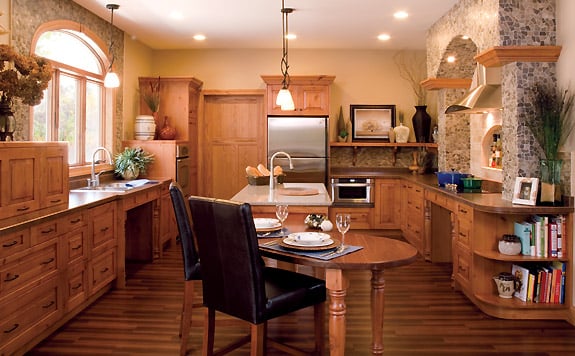
People interested in Aging in Place services and Aging in Place home improvements are generally looking for a level entry into their home along with the clear maneuverability that a more open floor plan with more extraordinary clear unobstructed floor space presents. They desire flat floors without transitions requiring steps or stairs to move around. Ramps having a correct 1:12 slope or less can be used to get them up to the level floor space at the exterior entries or the garage entrance. ADA-compliant kitchen cabinets and ADA bathroom cabinets will more than likely come into play to complete any accessible home remodeling project. Aging in Place services and home modifications should include adding non-slip flooring, widening hallways or installing stair lifts, and widening doors. You might consider lowering light switches and thermostats and installing easier-to-use lever door hardware. To provide safety and independence, many considerations for an Aging in Place design should be considered. Provide a clear barrier-free path or accessible route to the most visited areas of the home, as the ADA recommends. The three areas needing improvement for a person wanting to age in place include the bathroom, the kitchen, and the family area in order of importance. The goal of an accessible design in Austin is to make the areas in the home a safe space for everyone who uses the facilities, regardless of age, size, or ability.

For additional information about the CAPS program, visit nahb.org/CAPS. For more information about T-Square Company, visit www.tsquareco.com or call 512-444-0097 to schedule a home assessment by a CAPS professional.
Tags:
barrier free access,
aging in place remodeling,
aging in place home modifications,
ADA remodeling,
ADA bathroom cabinets,
aging in place remodels,
ADA kitchen cabinets,
aging in place construction,
aging in place designs,
accessibility home remodeling in Austin,
CAPS professional in Austin,
CAPS certification holder in Austin,
CAPS remodeling techniques,
disability bathroom remodeling in Austin,
bathroom modifications for elderly,
aging in place specialist,
aging in place services,
aging in place design,,
elder construction,
certified aging in place specialist,
handicap remodeling contractors in Austin,
independent living in Austin Texas,
aging in place specialist in Austin,
senior aging in place services,
Austin aging in place specialist,
barrier free design,
Age in Place at Home,
Professional Disability Remodeling Contractor,
aging in place services for seniors in Austin
After over a year of writing to fulfill my customers' requests, my new book, "Age in Place At Home," is finally available for purchase from Amazon. Go to the link below to order my paperback book, which was released in late November, 2022. It provides a great guideline for using the principles of Universal Design in new home construction and/or remodeling for every room in your home. Get your copy today.
https://www.amazon.com/gp/r.html?C=2Z24ENUUAEWUK&K=13Y7YU7PKKYAC&M=urn:rtn:msg:20221010201802eb9acb7b24004a4785cd2ec1d4f0p0na&R=3R6MK9WDXJPH7&T=C&U=http%3A%2F%2Fwww.amazon.com%2Fdp%2FB0BHTV28RV%3Fref_%3Dpe_3052080_276849420&H=7FWEPMGCH0TT8LN6SKPMUOCVJNYA&ref_=pe_3052080_276849420
A home's adaptability is one of the most desired qualities within a person's home during some point in their life as their or their family's needs change. These specific needs to enhance accessibility can be short term while recovering from an accident or illness at any age, or these home alterations may become permanent. The special needs may concern an adult or a child. Universal design principles don't discriminate between any family members regardless of age, size, or ability. Every family member is included. Learn how to adapt your home environment to satisfy your family's needs in David Traut's new book, Age in Place at Home.

T-Square Company, in Austin, Texas, practices Universal Design accessibility to segue into Aging in Place seamlessly. The essence of my book is to advise people so they understand why our homes are obsolete to us, the homeowners, the minute they are completed. This fact is represented by the methodology used to create the traditional home. They are built to satisfy our immediate lifestyle and physical needs on the day we close on the house, with no regard for the future. The new home lacks adaptability to satisfy our needs once our bodies change beyond the purchase date. If we had incorporated the Universal Design principles into these new homes, those same homes would adapt to our changing family needs including every inhabitant regardless of age, size, or ability. The lack of home adaptability is not the consumers fault, they have always been unaware of how to reference the problem and accepted what the housing market gave them. They were unaware of what to ask for. Hence, the status-quo of building has been perpetuated for over a hundred years.
T-Square Company offers all types of Austin Universal Design home modifications to better prepare you and your family for your unforeseeable home accessibility future on a design/build basis. Existing, traditional homes must be modified to increase their accessibility using correct designs. Become aware and embrace the knowledge that the principles of Universal Design offer greater home accessibility for every one of your home members, from your father to your son. This is why the process is known as inclusive design.
David L. Traut, CAPS, has been involved with accessibility for nearly thirty years for the VA, HUD, and private residences. Contact me at 512-444-0097 for a professional home assessment to guide your future accessibility needs or at www.tsquareco.com. Simply fill out your information on the contact us page.
.
Tags:
aging in place home modifications,
aging in place home improvements in Austin,
wheelchair accessible remodeling,
CAPS certified remodeling in Austin,
aging in place construction,
CAPS professional in Austin,
aging in place services,
accessibility designs Austin Texas,
austin custom walk in shower,
universal design ideas,
Austin Accessibility Design,
aging in place design in Austin,
why is aging in place important,
what does it mean to age in place,
universal designbuilding for the future,
wheelchair accessible home remodeling in Austin,
universal design remodeling contractor,
why is universal design important,
7 principles of universal design,
universal principles of design,
universal design/build contractor,
universal design vs. aging in place,
universal design contractor,
wheelchair accessible housing,
accessible homes in austin,
Austin home remodeling for disabled,
universal home design in Austin,
aging in place versus universal design,
universal design home builder,
universal design home additions,
barrier free design,
Austin home accessibility solutions,
Austin home modification services,
Age in Place at Home,
universal design forever homes
When families are suddenly thrust into caring for an ill or injured family member, knowing how to make their homes accessible, barrier-free and safe can be challenging. Here is where a professional CAPS-certified remodeler is needed. It's not for everyone, but as increasingly older Americans choose to Age in Place and remain in their homes, issues related to maintaining mobility, promoting home safety, and creating an environment to meet care needs are becoming increasingly crucial to caregivers and care recipients. Even savvy and experienced families may have trouble figuring out whom to call for a roll-in shower or door widening. According to the AARP, nearly 90% of older adults want to Age in Place and maintain independence however, 85% have done nothing about it. Many retirees want to stay in their own houses for as long as possible. But being able to do so will depend on how easy it is to maneuver your home as you age. Research by the Centers for Disease Control and Prevention shows that Aging in Place home modifications may prevent up to 50% of home accidents among seniors in older homes, including falls.

The National Association of Home Builders, in partnership with the AARP and Home Innovation Research Labs, created the CAPS program, which includes training and education on the technical, business management, and customer service skills essential to compete in the fastest-growing segment of the residential remodeling industry--home modifications for Aging in Place. David L. Traut, CAPS owner of T-Square Company in SW Austin, Texas as a handicap remodeling contractor, is one of the select group of professionals nationwide to earn the Certified Aging-In-Place Specialist (CAPS) designation, identifying him as a home remodeler and builder with the skills, training, and knowledge necessary to design and remodel or modify a home to meet the unique needs of the older population, disabled owners, or their visitors. T-Square Company offers a complete line of Aging in Place services using their design/build approach.

ADA-Compliant Kitchens

People interested in Aging in Place services and Aging in Place home improvements are now looking for a level entry into their home along with the maneuverability that a more open floor plan with more extraordinary clear unobstructed floor space presents. They desire flat floors without transitions requiring steps or stairs to move around. Ramps having a correct 1:12 slope or less can be used to get them up to the level floor space at the exterior entries or the garage access. ADA-compliant kitchen cabinets and ADA bathroom cabinets will more than likely come into play to complete any accessible home remodeling project. Aging in Place services and home modifications should include adding non-slip flooring, widening hallways or installing stair lifts, and widening doors. You might consider lowering light switches and thermostats and installing easier-to-use lever door hardware. To provide safety and independence, many considerations for an Aging in Place design should be considered. You should try to provide a clear barrier-free path or accessible route to the most visited areas of your home, as the ADA recommends. The three areas needing improvement for a person wanting to age in place include the bathroom, the kitchen, and the family area in order of importance.
All disability home remodeling or disability bath remodels in Austin must be done considering all the data provided by the client, his or her family, and any caretakers involved. Aging in Place design must be carried out by an Aging in Place specialist who is also a reputable residential remodeling professional. The goal of an accessible design in Austin is to make the areas in the home a safe space for everyone who uses the facilities. T-Square Company's Aging in Place services use Universal Design to accommodate wheelchair users and can make the home environment more comfortable for all generations with or without specific needs.

Let's compare the alternative costs associated with aging in place versus when you already own your home. The more institutional alternative of assisted living accompanied by more medical expertise and staff training plus the access to emergency medical facilities is available as opposed to renting an apartment. These are two of the main alternative choices for seniors who decide not to remain in their own homes. According to a national study done in 2019, the average cost for assisted living ranged from $8,000 to $9,500 per month. However, if you decide to Age in Place in a high-quality one-bedroom apartment, the rent will run around $1,700 per month. Living in your own home or with loved ones represents a preference by most seniors and property taxes must be taken in account.
For additional information about the CAPS program, visit nahb.org/CAPS. For more information about T-Square Company, visit www.tsquareco.com or call 512-444-0097 to schedule a home assessment by a CAPS professional.
Tags:
barrier free access,
aging in place remodeling,
aging in place home modifications,
ADA remodeling,
ADA bathroom cabinets,
ADA kitchen cabinets,
aging in place designs,
accessibility home remodeling in Austin,
CAPS professional in Austin,
CAPS certification holder in Austin,
CAPS remodeling techniques,
disability bathroom remodeling in Austin,
bathroom modifications for elderly,
aging in place specialist,
aging in place services,
elder construction,
certified aging in place specialist,
handicap remodeling contractors in Austin,
independent living in Austin Texas,
senior aging in place services
After a Year of writing to fulfill my customers' requests, my new book, "Age in Place At Home," is available for pre-order from Amazon. Go to the link below to preorder my book, which will be released on October 19, 2022.
https://www.amazon.com/gp/r.html?C=2Z24ENUUAEWUK&K=13Y7YU7PKKYAC&M=urn:rtn:msg:20221010201802eb9acb7b24004a4785cd2ec1d4f0p0na&R=3R6MK9WDXJPH7&T=C&U=http%3A%2F%2Fwww.amazon.com%2Fdp%2FB0BHTV28RV%3Fref_%3Dpe_3052080_276849420&H=7FWEPMGCH0TT8LN6SKPMUOCVJNYA&ref_=pe_3052080_276849420
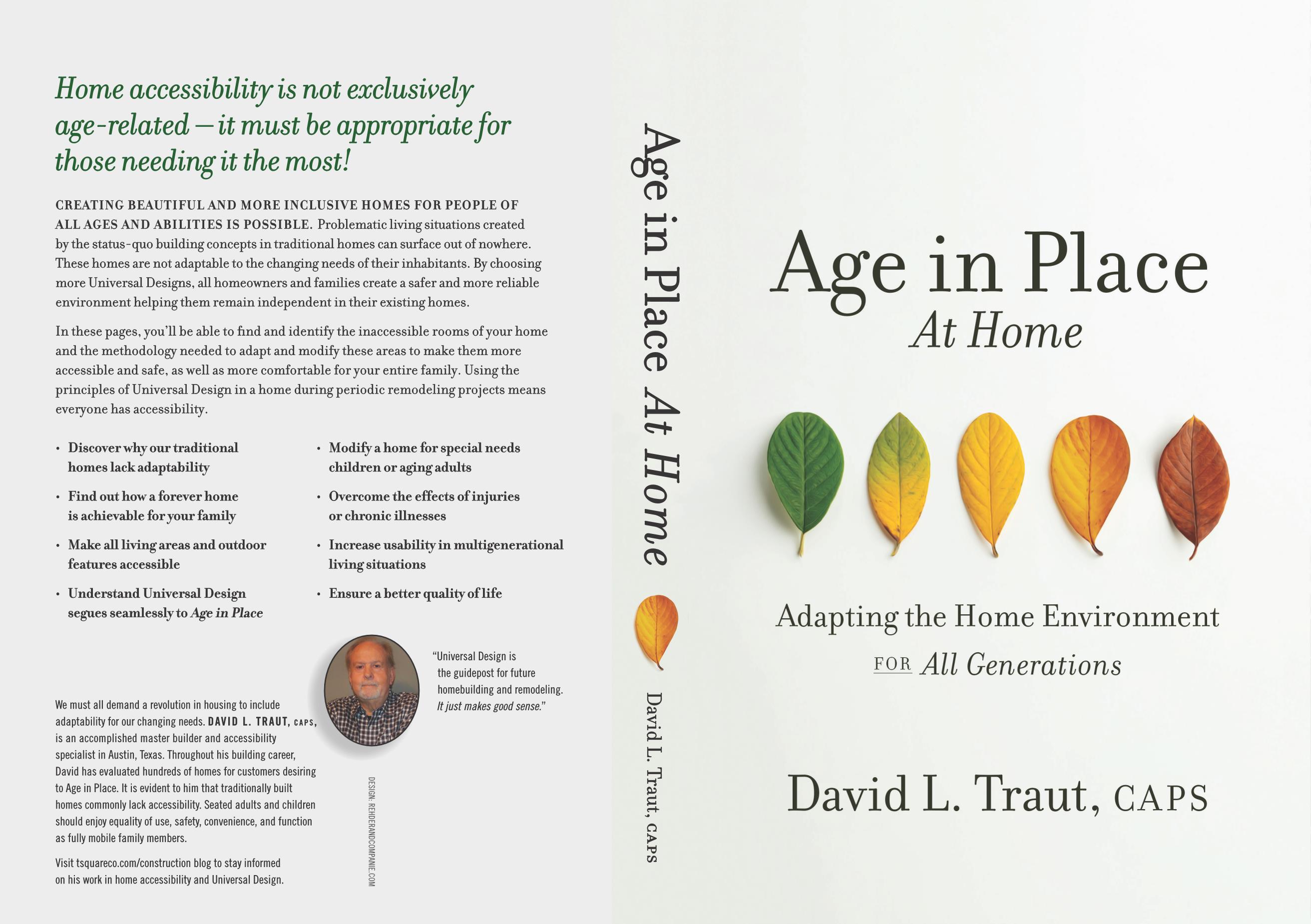
T-Square Company, in Austin, Texas, practices Universal Design accessibility to segue into Aging in Place seamlessly. We offer all types of Austin Universal Design home modifications better to prepare you for your unforeseeable home accessibility future. The principles of Universal Design offer greater home accessibility for every one of your home members, from your father to your son. This is why the process is known as inclusive design.
David L. Traut, CAPS, has been involved with accessibility for nearly thirty years for the VA and private residences. Contact me at 512-444-0097 for a professional home assessment to guide your future accessibility needs or at www.tsquareco.com. Simply fill out your information on the contact us page.
.
Tags:
aging in place home modifications,
aging in place home improvements in Austin,
wheelchair accessible remodeling,
CAPS certified remodeling in Austin,
aging in place construction,
CAPS professional in Austin,
aging in place services,
accessibility designs Austin Texas,
austin custom walk in shower,
universal design ideas,
Austin Accessibility Design,
aging in place design in Austin,
why is aging in place important,
what does it mean to age in place,
universal designbuilding for the future,
wheelchair accessible home remodeling in Austin,
universal design remodeling contractor,
why is universal design important,
7 principles of universal design,
universal principles of design,
universal design/build contractor,
universal design vs. aging in place,
universal design contractor,
wheelchair accessible housing,
accessible homes in austin,
Austin home remodeling for disabled,
universal home design in Austin,
aging in place versus universal design,
universal design home builder,
universal design home additions,
barrier free design,
Austin home accessibility solutions,
Austin home modification services,
Age in Place at Home,
universal design forever homes





















